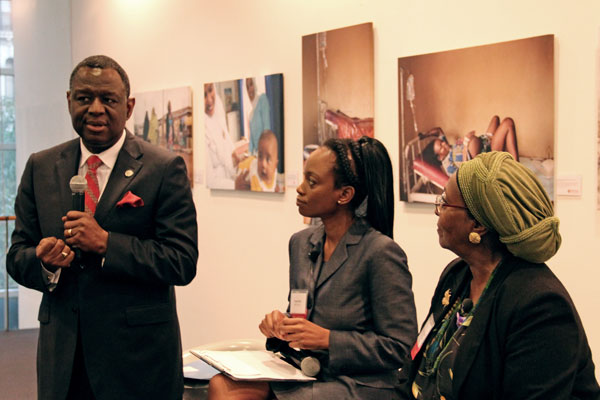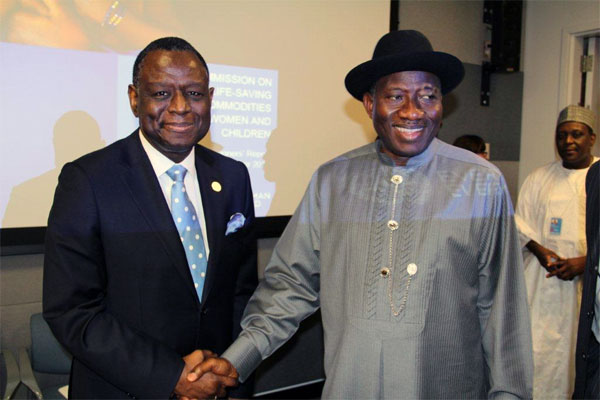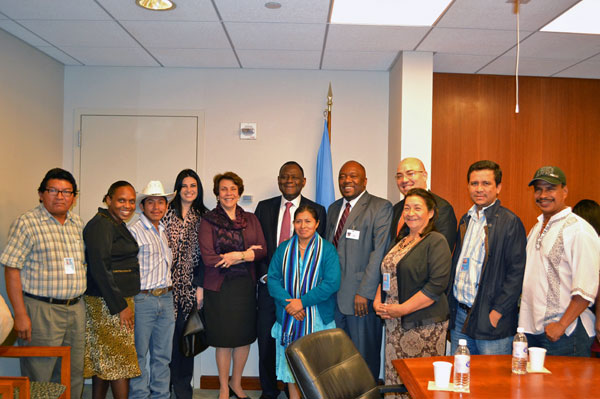News
Keeping a Focus on Women and Young People at the General Assembly
- 27 September 2012
News
UNITED NATIONS, New York — The 67th regular session of the UN General Assembly began last week against a backdrop of violence and tensions in the Arab World, and a damping down of some of the excitement and hope that animated last year’s meeting of world leaders.
Throughout the week, UNFPA, its Executive Director Dr. Babatunde Osotimehin, and many partners emphasized the urgency of continuing to investing in women and young people in ways that make a difference. Following are a few highlights of a very busy week.
Thursday, 27 September - Dr. Osotimehin was the keynote speaker at Ripple Effect , a photo exhibition hosted by international NGO, PATH. The Executive Director was joined by Edna Adan Ismail, a Somalian nurse, midwife and former First Lady. The event launched a new report, Safeguarding Pregnant Women with Essential Medicines.
At the event Dr. Babatunde stressed the importance of giving women and young girls the opportunities to improve their life chances. “We must educate girls to liberate them. To allow them to go to school, to make their own choices: when to get married, to use contraception, to decide how many children to have and even to determine the spacing between their children,” he said.

Ms. Ismail reinforced these crucial points, “The biggest killer isn’t childbirth, it is ignorance. Ignorance is the biggest killer of women. We must educate and train women and girls about their choices.”
Both speakers reinforced the importance of family planning and the presence of midwives during birth. Ms. Ismail acknowledged and thanked UNFPA for its support in training midwives. To date, Ms. Ismail has trained 200 midwives. H er goal is to recruit and train 1,000 midwives throughout Africa.
The exhibit featured a selection of photos from UNFPA and other organizations that work to improve maternal health. The full set of photos is available for viewing here.
Wednesday, 26 September -- At the launch of the report of the UN Commission on Life-Saving Commodities for Women and Children, President Goodluck Jonathan, of Nigeria, said that it is important to give women and girls access to family planning: "We need to encourage them to decide when to have babies and give them the means to plan pregnancies. This is especially true for young girls, who sometimes are not prepared to be mothers. And young men, who are not prepared to be fathers." But he noted that lack of resources for providing access is a reality for many developing countries.

President Jonathan mentioned an upcoming high-level event in Abuja, the capital, in October to discuss priorities and start the implementation of the recommendations released today by the Commission. Prime Minister Jens Stoltenberg of Norway, who co-chairs the Commission together with President Jonathan, said that his government is also committed to help implement the recommendations. UNFPA Executive Director Babatunde Osotimehin and UNICEF Executive Director Tony Lake serve together as vice-chairs.
At meeting, former US President William Clinton announced a new partnership that will make a safe, effective, long-acting, reversible method of contraception available to more than 27 million women in the world's poorest nations.
Tuesday, 25 September -- Official representatives of the Honduras’ delegation to the General Assembly met with UNFPA Executive Director, Dr. Babatunde Osotimehin and Ms. Kate Gilmore, Deputy Executive Director (Programme).

UNFPA acknowledged Honduras government´s leadership in its National Development Plan, which includes a strong demographic component and recognizes the need for national policies that consider the country's´ demographic dynamics, including the importance of its large youth population, estimated at 34.9 per cent.
Monday, 24 September -- At a meeting on the implementation of the Secretary-General's Global Strategy for Women's and Children's health, Dr. Osotimehin met with leaders of the other agencies that comprise the H4+ as well as with donors, dignitaries and First Ladies.
At that meeting the First Lady of Zambia, Dr. Christine Kaseba Sata, said that, with the support of the H4+, including UNFPA, her country has been able to improve several health indicators. "We have had success, yes. But we also have challenges. Health system bottlenecks remain, especially regarding human resources for health." According to Dr. Kaseba, the fact that health personnel is not evenly deployed in her country make things worse.

In addition several donors announced their continued support of the initiative, including Canada and Sweden, which pledged $52 million in support of the H4+. The U.S. firm of Johnson & Johnson also pledged its commitment, reiterating their focus on innovation as one of the keys to overcome challenges and achieve the health MDGs.
Dr. Osotimehin also participated in the panel discussion on ending female genital mutilation and cutting, and event organized by the First Ladies of Benin and Burkina Faso.

Early on Sunday, 23 September, Dr. Osotimehin joined a ‘Countdown to 2015’ breakfast meeting that also served as the launch of a new report from the Partnership for Maternal, Newborn and Child Health, which reviews progress on commitments made by 220 stakeholders in support of Every Woman Every Child initiative.
During the discussion, the UNFPA Executive Director spoke about the importance of clarity and transparency. “What we need to do is advocate for clear plans, advocate for resources, track resources, track implementation and make sure we evaluate what we are doing.”
Later that day, the Executive Director took part in a panel discussion about youth collective action during the 2012 Social Good Summit. Since 2010, this global conversation has taken place each year during the time of the General Assembly to share digital solutions to development issues. The Executive Director took the opportunity to encourage young people to educate themselves about, and align themselves with the millions of young girls around the world who see their hopes for a bright future diminished by early marriage.
--- photos and reportage by Etienne Franca